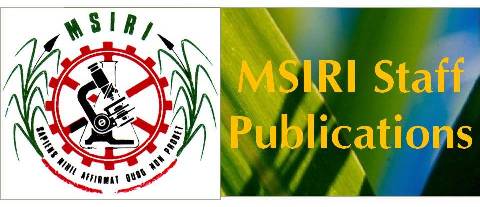Breeding and selection programme at the Mauritius Sugar Industry Research Institute
| MSI99P3057 | |
| Domaingue, R. Ramdoyal, K. Mamet, L. D. Bissessur, D. Rivet, L. | |
| Breeding and selection programme at the Mauritius Sugar Industry Research Institute | |
| Abstracts - 4th ISSCT Breeding and Germplasm Workshop: efficiency of sugar cane breeding, Hotel Coralia, Mont Choisy, Mauritius, 18-22 May 1998 | |
| book chapter | |
| 1998 | |
| p. 1 | |
| Réduit: Mauritius Sugar Industry Research Institute | |
| Abstract only | |
| En | |
| En | |
| In Mauritius sugar cane is cultivated in a wide range of environments, ranging from the drier lowlands (1200 mm annual rainfall) to the central and elevated (600 m) plateau where high annual precipitation prevails (up to 4000 mm). There are five major and three minor soil types on which cane is grown. As a result, up to twelve environments have to be considered for breeding purposes. The MSIRI sugar cane breeding and selection programme aims at producing higher-yielding varieties for these contrasting environments. Breeding for specific adaptation has been strengthened during the last decade and tow varieties adapted to drought conditions have been released in 1996. Breeding for disease resistance is possible as a result of the identification of a three to four gene system controlling yellow spot resistance. The genetics of resistance to rust anad leaf scald is underway. varieties suitable for harvesting at different periods are currently being created. More emphasis has been laid during the last decade on the development of early-ripening varieties with higher sucrose content. Nine out of eleven varieties released since 1988 are suitable for early harvest. A recurrent selection programme for high sucrose has been adopted with a view to produce even richer canes. Other important characteristics are ratooning capacity, attractive morphological attributes, rapid grmination and good early ground cover, easy or self-trashing and suitability for mechanized harvest. Hybridization is undertaken with the help of known parents on the basis of combining abilities. Currently cross evaluation techniques are being adopted to improve the choice of parents. A policy aimed at widening the genetic base has been adopted with the help of foreign parents as well as interspecific hybridization. Crosses are planned with the help of a tailor-made computer system to satisfy the set objectives. the selection programme has been completely reviewed in 1997 with a view to improve its efficiency. Varieties are selected from 100 000 seedlings and established in diverse environments as from the second stage. Sequential sampling is being adopted. The programme has been shortened and 60 to 80 varieties are selected from the preliminary phase after the sixth year. The multiplication of varieties in special multiplication nurseries also enables an earlier utilization of new parents in the crossing programme. Evaluation of varieties at the final phase of selection is done in two sets of regional trials harvested at different periods. Varieties are released after 5 years of evaluation. A growers' participatory appproach is being adopted whereby up to ten promising varieties are distributed to the industry 2-3 years before release for semi-industrial evaluation. The whole variety development programmed is managed with the help of a modern computer system operating within a LAN. Databases havae been designed and quick and easy access to information is possible. Forty-three varieties have been released by MSIRI since its creation in 1953. Sugar yield has increased from 7.1 to 8.5 t/ha, the major contribution being from new varieties. | |
| SUGARCANE BREEDING SELECTION VARIETIES | |
| MAURITIUS | |
| Cane breeding and genetics | |
| Breeding: Methods: Policies and methods | |
| 1998-06-29 | |
| En | |
| LIB | |
| CAT | |
| 1 | |
| PB |
